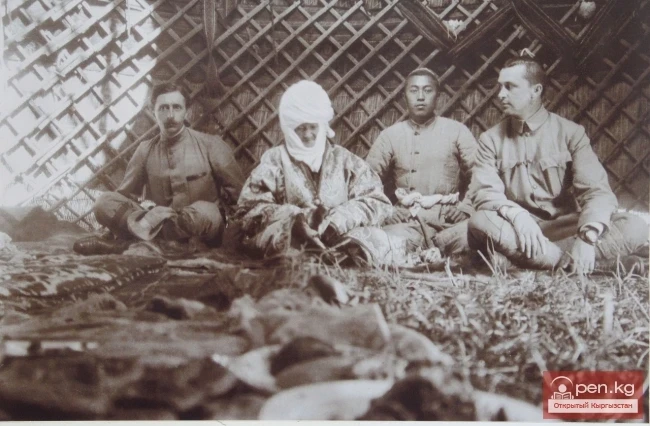Foreign Policy of the Kyrgyz in the 18th - Early 20th Century
During the period in question, Kyrgyzstan was unable to conduct any foreign policy. However, individual Kyrgyz biis, both as part of the Kokand Khanate (Kushchu-biy — mid-18th century, Nuzup-biy — 1830s, Alymbek datka — 1850s-60s, and Alymkul atalyk — 1860s) and independently, intervened in international affairs (Atake-biy, who sent an embassy to St. Petersburg in 1785-1787, Ormon-khan — 1840s-50s, Kachybek Sheralin — 1850s). These actions were aimed at establishing relations between the Kokand Khanate and neighboring countries (Kushchu-biy, Nuzup-biy), establishing diplomatic relations with Russia (Atake batyr), creating an independent Kyrgyz domain (Alymbek datka, Ormon-khan), accepting Russian citizenship (Kachybek Sheralin), or engaging in military struggle against the Russian army (Alymkul atalyk).
Kyrgyzstan has always remained a territory of great geopolitical significance in Central Asia. The main goal of seizing the territory of the Kyrgyz, both by the Kokand khans and by the Russian Empire, was the geopolitical importance of Kyrgyzstan as a bridge to Eastern China, as a geographically convenient foothold for political influence over regions west of China. Thus, in the initial period of colonization, Kyrgyzstan was important to Russia as a base for conquering territories to the south of it. Starting from the 1870s-80s, Kyrgyzstan served as a base for the political and economic influence of the Russian Empire in the region in contrast to China.
Read also:
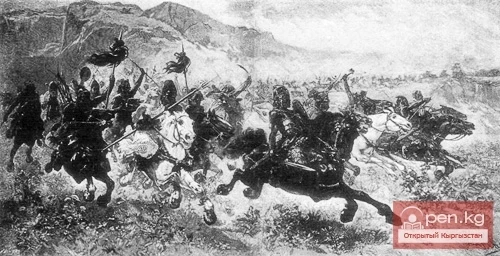
Military Forces of the Kyrgyz in the 18th - Early 20th Century
Since the Kyrgyz did not have their own state formation during the period in question, there is no...
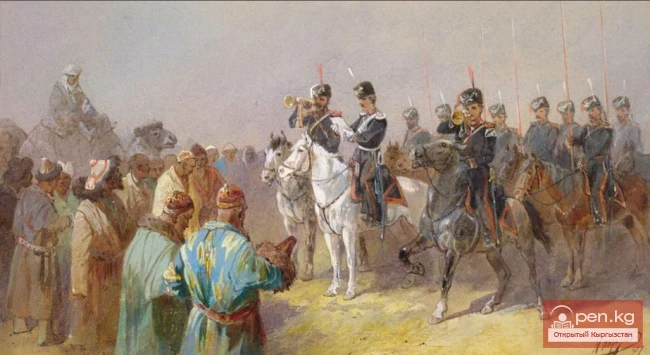
Kyrgyz in the Russian Empire
The Conquest of the Kyrgyz by Russia. In the last quarter of the 18th century, the southern tribes...

The Territory of the Kyrgyz in the 18th to Early 20th Century
During the period under consideration, the Kyrgyz population occupied approximately the same part...
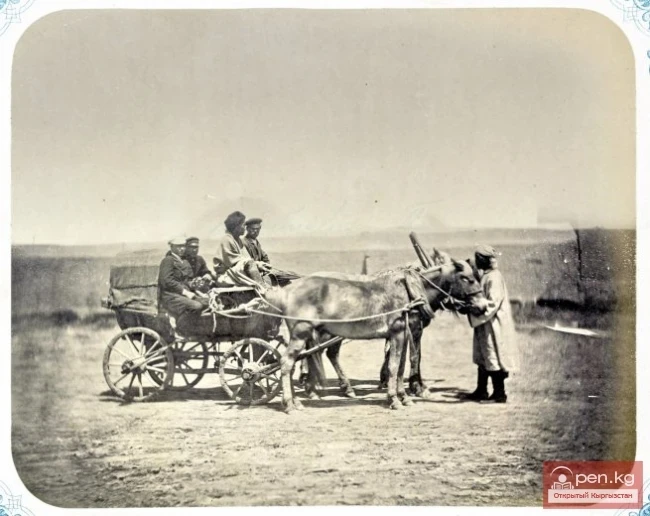
Historical Preconditions for the Convergence of the Kyrgyz with Russia
Until the mid-19th century, the Kyrgyz people were under the rule of the Kokand Khanate. The...

Natural Resources of the Kyrgyz in the 18th - Early 20th Century
Even during the time of the Kokand Khanate, the wealth of the subsoil of Kyrgyzstan was well...

Kyrgyz Elite During the Domination of the Kokand Khanate
Kyrgyz Elite During the dominance of the Kokand Khanate, some changes occurred in the social...
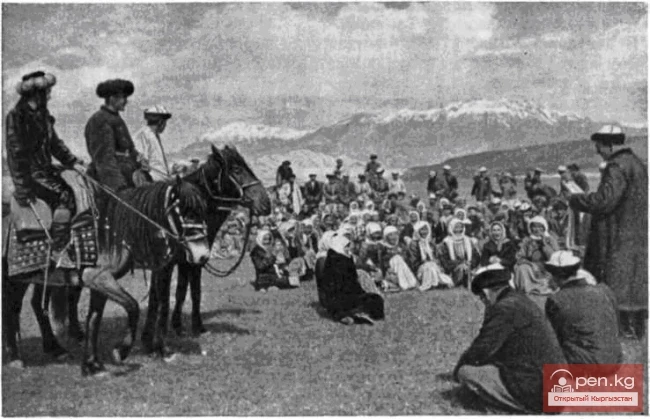
Governance in Kyrgyzstan in the 18th to early 20th Century
The new period of Kyrgyzstan's history spans from the 18th to the early 20th century. It can...

The Population of Kyrgyzstan in the 18th - Early 20th Century
Historical information about the size of the multi-ethnic population of the Fergana Valley during...

The Ascent of the Alai Queen to the Political Olympus of the Khanate
The Uncontested Ruler Aalaya In the early 1860s, when Mullah Alymkul was still the ruler of Osh,...
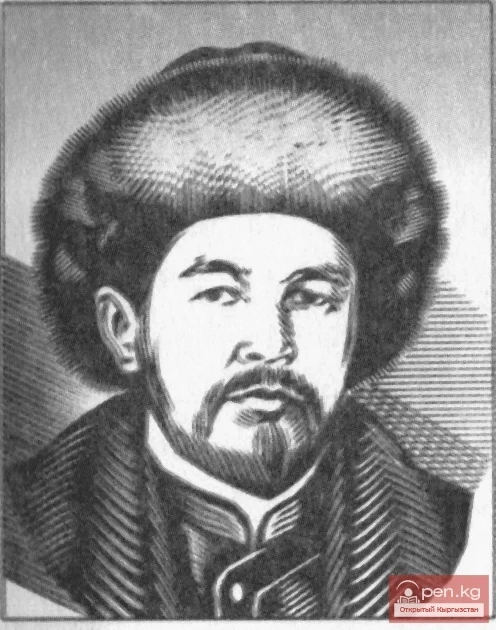
Alimbek Datka
The childhood and youth of Alymbek Datka were spent in Alai - a harsh but fabulously beautiful...

The Geopolitical Environment of the Kyrgyz Before the 6th Century
Since the Sakas did not have a centralized state, they did not conduct a specific foreign policy....

Kyrgyz as Creators of the Kokand Khanate
Kyrgyz of Fergana Together with Uzbeks Created the Kokand Khanate Every person, no matter how...

Expansion of the Military-Political Presence of the Russian Empire in Central Asia
The First Expeditions of the Russian Empire to Eastern Turkestan In exploring the biography of...

Ormon Khan
In times long past, there lived a famous Kyrgyz manap, Ormon, a person of strong will, very...

The Science of the Kyrgyz in the 18th - Early 20th Century
The second half of the 19th century and the beginning of the 20th century marked an era of...

Kubat Bi
One of the main characters of oral folk art....
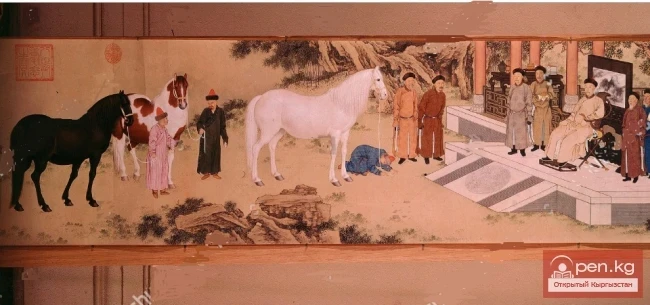
Kyrgyz Feudal Lords in Search of Allies
Multi-Step Politics of Kyrgyz Tribes in the Late 18th Century In the late 18th century, Kyrgyz...

Events of the Second Half of the 18th Century in Southern Kyrgyzstan
Events 200 Years Ago Let’s return to the events of 200 years ago. What was Osh primarily for the...

Kyrgyz-Kokand Relations in the 18th Century
The Important Political Role of the Kyrgyz in Fergana at the End of the 18th Century With the...
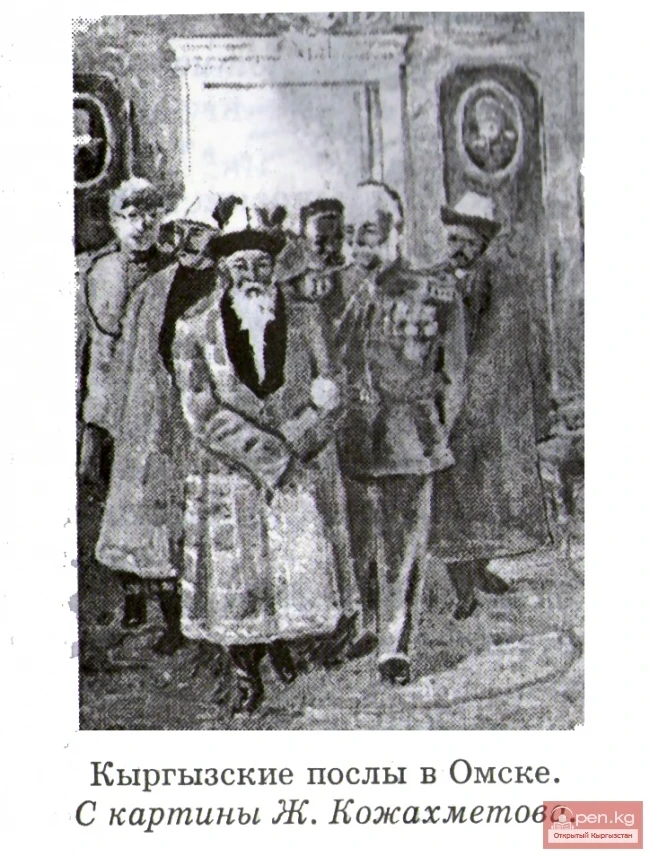
The Joining of Northern Kyrgyzstan to Russia
The Creation of an Independent Kyrgyz Khanate and Its Collapse. In the mid-19th century, the...

The Conquest of Southern Kyrgyzstan by Russia
In the mid-19th century, the population of Southern Kyrgyzstan was still under the yoke of the...

Politics in Eastern Turkestan in the Late 50s-60s of the 18th Century.
The Defiance and Bravery of the Kyrgyz The ambitions of the Qing dynasty and their aggressive...
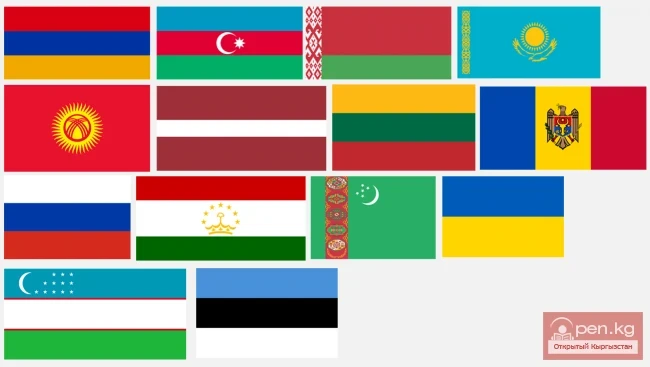
The Foreign Policy of Kyrgyzstan
Kyrgyzstan is a state in the Central Asian region, whose location has significant geopolitical and...

Kyrgyz Management System
POWER SYSTEM AND MANAGEMENT INSTITUTIONS According to historical sources, the Kyrgyz people went...

Education of the Kyrgyz in the 18th - early 20th century
It is known that in the 18th century, the Kyrgyz, although rarely, used a new writing system, as...
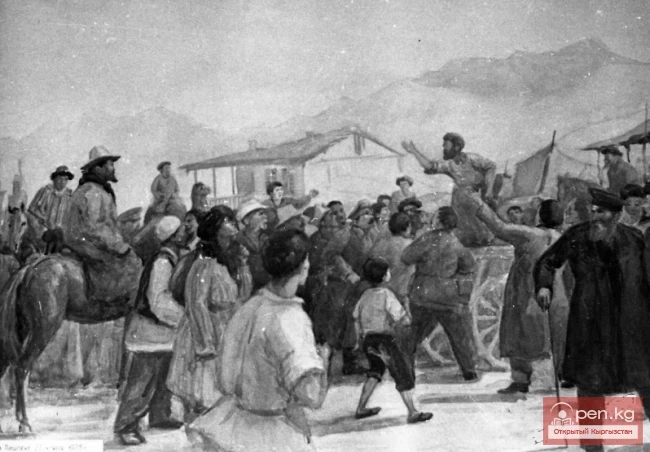
Anticolonial Protests of Indigenous Peoples in the Region in the 1880s-1890s
Anti-colonial Protests of Indigenous People Although in mid-February the entire territory of the...
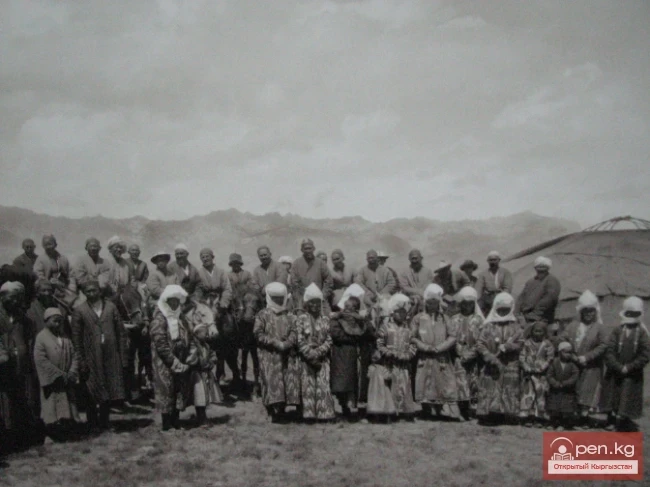
How the Kyrgyz Entered the Kokand Khanate
The Birth and Change of Dynasties of the Future Alay Queen Before delving into the era in which...

The Territory of the Kyrgyz in the VI—XVIII Centuries
All political entities of the Middle Ages in the territory of Central Asia somehow affected the...
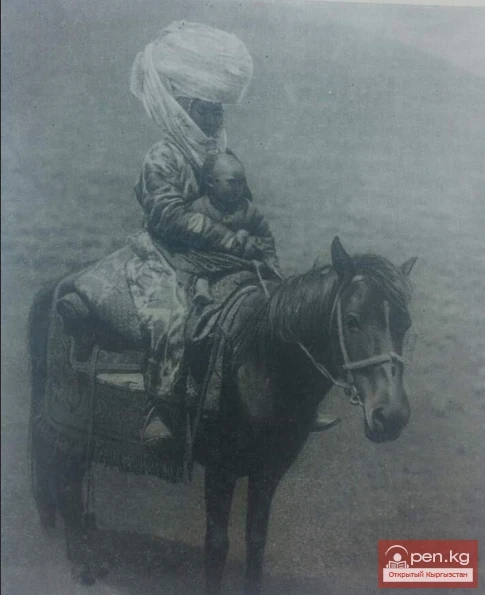
Kurmanjan Datka - Queen of Alai. Part 2
Kurmanjan Datka. Part - 2 After marrying Alymbek Datka, she did not become pregnant for seven...

Alymbek - the Main Figure in the Khanate under Sha-Murad
The Removal of Malla-Khan by Alymbek Being a perceptive researcher, Duygamel, who closely observed...

Alimbek Datka and His Madrasah
Alymbek's Madrasah The city of Osh in the 19th century, which we detailed in the previous...
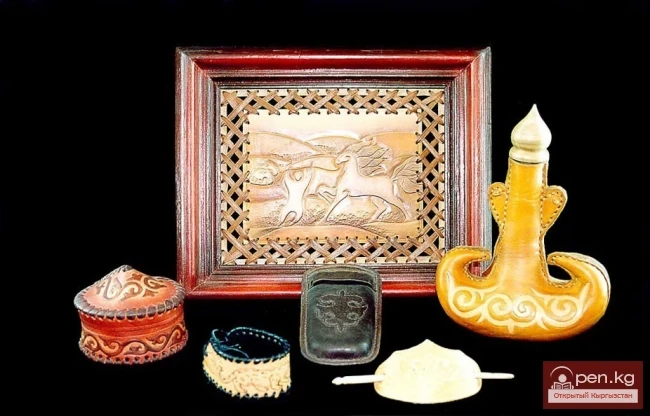
Ethnic Origins and Stages of Formation of the Kyrgyz Nationality
The formation of the Kyrgyz people is connected with ethnic processes in ancient and medieval...
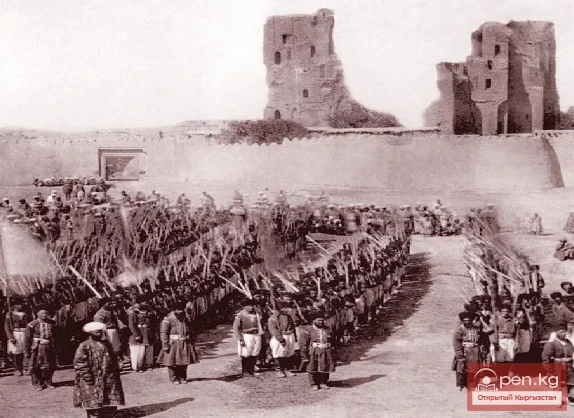
The Performances of the Kyrgyz in the First Half of the 1860s
National Liberation Movement Against the Kokand Khanate On June 1, 1868, a clash occurred between...

Uprisings of the Kyrgyz from 1845 to 1848 Against the Kokand Khanate
Uprisings of the Kyrgyz against the Kokand Khanate The internecine feudal struggle between the...
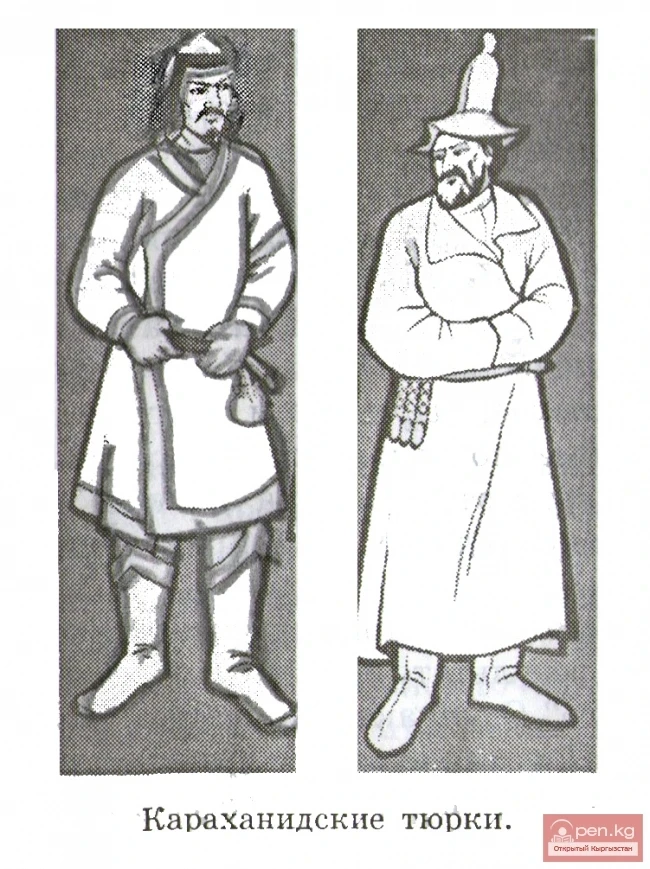
The State of the Karakhanids (940—1212)
Karakhanid State (940—1212 years). From the mid-10th century to the early 13th century, the Turkic...

The title translates to: "The Closer Ties Between Kyrgyzstan and Russia."
Atake Batyr was a biya - the ruler of the Sarybagysh clan, living in the Chuy Valley. To hide a...

Kyrgyz Waqf of the 19th Century
Kyrgyz Vakf The so-called Kyrgyz vakf of the 19th century is not an exceptional phenomenon,...

Concert "RETRO-HITS of the 20th Century"
The State Philharmonic Chamber Orchestra of Kyrgyzstan presents to you a new experimental project...

The title "Атаке баатыр" translates to "Attack of the Hero" in English.
He lived between the 18th and 19th centuries. He was a significant figure, becoming an...
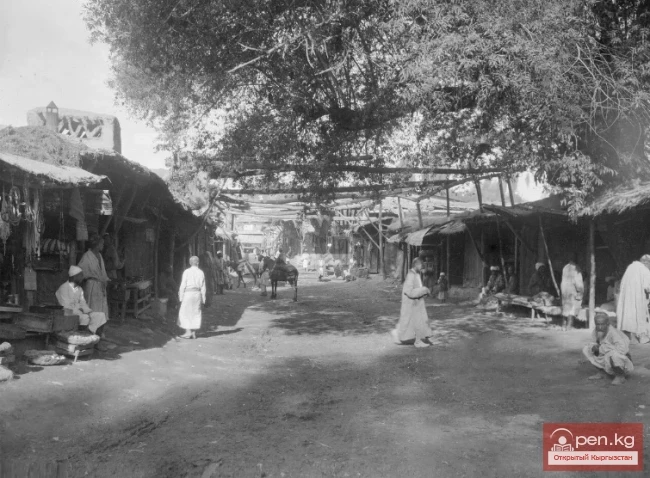
Osh in the Early 20th Century
Growth of the City in the Early 20th Century Little expanding in the pre-war years due to its...

Kyrgyzstan — China
On December 27, 1991, the Government of the People's Republic of China recognized the...

The Geopolitical Environment of the Kyrgyz in the 6th—18th Centuries
The Turkic states pursued an active foreign policy and participated in geopolitical games in the...

The Bet of the Alai Queen on the Defense of the "White Tsar"
Geopolitical Relations Between the Russian Empire and Central Asia It is characteristic that the...

The Territory of the Kyrgyz from Ancient Times to the 6th Century
The Saka tribes were divided into three parts. In the southern regions of Kyrgyzstan lived the...

The Struggle of the Russian Empire and Britain for Central Asia
A New Surge of Anglo-Russian Rivalry in Central Asia was associated with the Russian conquest of...

Military Forces of the Kyrgyz in the 6th to 18th Centuries
The structure, organization, and supply of the armed forces of the Kyrgyz during that period were...

Statistics of Osha in the 1880s
The City of Osh in the 1880s According to all the aforementioned eyewitness accounts, there was no...

"Progenitor" of the Kyrgyz Ethnicity of the 12th Century
Ibrahim ibn Ahmed and Anal-Hakk Thus, the "progenitor" of the Kyrgyz ethnicity of the...
